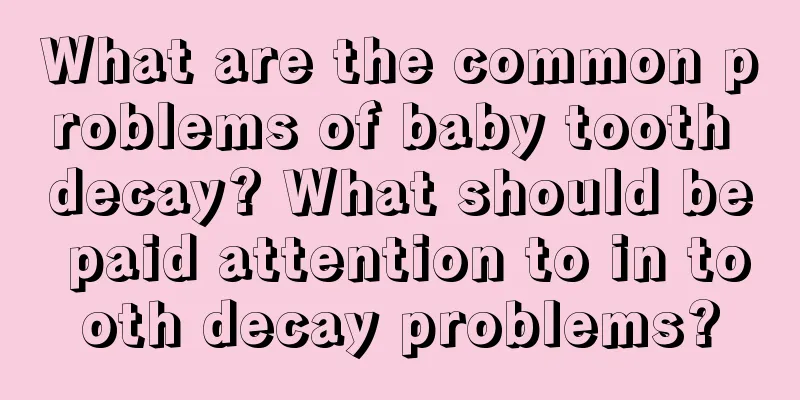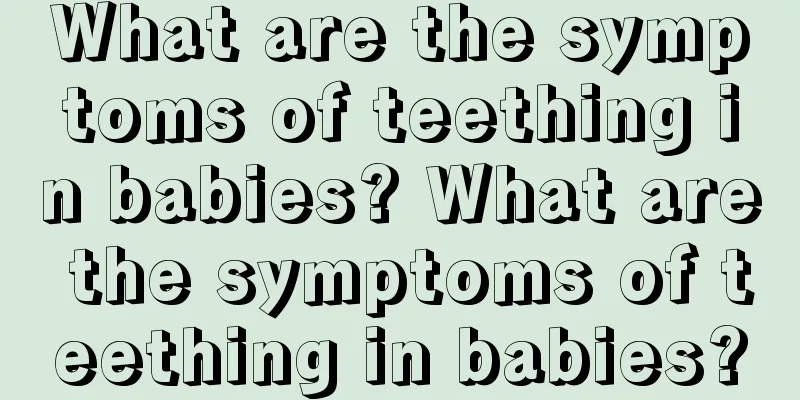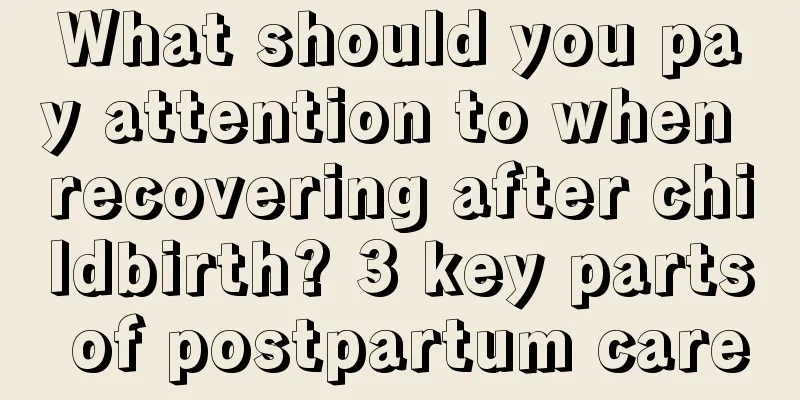What are the common problems of baby tooth decay? What should be paid attention to in tooth decay problems?

|
Dental caries, also known as tooth decay, is a common disease in children. So, what are the common problems of dental caries in babies? Common problems with baby tooth decay1. Tooth decay will cause great pain when chewing, so when eating, you will habitually want to avoid that area. If this becomes a habit, it will cause problems in facial development in the future, and the chewing habit may also cause maxillofacial deformities. 2. As the infection progresses, it may continue to cause other dental problems, such as inflammation of the dental pulp tissue, or poor development of permanent teeth, etc. When there are problems with the teeth, it will also affect the appetite, eating habits, and cause oral deformities, which will eventually cause problems with the child's pronunciation. 3. It is actually harmful to the development of the whole body, and tooth decay will have a serious impact on the child's future mental health, making the child feel inferior, etc. Symptoms of tooth decay in babiesThe symptoms of baby caries can be divided into shallow, medium and deep caries according to the degree of caries destruction. Shallow caries: The lesions are only in the enamel. The color of the teeth should originally remain the same. When black spots or decalcified white spots begin to appear on the surface, or when food is always stuck in a certain place, it means that the enamel of the teeth at this place has been destroyed, and the child will not feel any discomfort. Medium caries: The lesions have reached the dentin, forming shallow caries holes. At this time, children are sensitive to cold, sour, and hot stimuli and are prone to soreness or discomfort. If food gets stuck in the teeth, they will feel uncomfortable. However, the discomfort will be relieved after the food is cleaned out. Deep caries: The lesions have reached the pulp cavity and the pain will last for a while before disappearing. If not treated, the bacteria will reach the apex along the root, causing apical ophthalmitis, resulting in chronic lesions, causing inflammation of the alveolar bone and mandible, osteomyelitis and systemic diseases. Diet therapy for baby tooth decay(1) High protein and fat: High protein can inhibit the occurrence and spread of dental caries, and fat can effectively protect teeth. (2) Mineral element fluorine: Fluorine has an anti-acid effect and can effectively prevent tooth decay by acting on tooth enamel. Foods that supplement fluorine include chicken, eggs, lettuce, wheat flour, carrots, milk, etc. However, it should be noted that excessive fluorine supplementation is harmful. Too much fluorine can cause fluorosis, damage teeth and even joint health. (3) Calcium supplementation: Calcium supplementation can enhance the calcification of teeth and effectively prevent tooth decay. There are many foods rich in calcium, such as oysters, kelp, seaweed, loach, fish, cauliflower, rapeseed, corn, walnuts, hawthorn, etc. (4) Vitamin D: Many parents know that vitamin D can promote calcium absorption and enhance bone development. Various fish and dairy products are rich in vitamin D. How to prevent tooth decay in babiesAvoid falling asleep with a bottle in your mouth. It is best not to feed your baby sweet drinks such as juice during infancy, and do not let him fall asleep with a pacifier (or nipple) in his mouth, otherwise it will cause bacteria to grow in his mouth during sleep. Using a pacifier dipped in honey or sugar to comfort the baby will also increase the chance of harmful bacteria growing on his gums and teeth, which can easily lead to tooth decay. Do not use your mouth to "clean" the pacifier or spoon. Many parents like to use their mouths to "clean" the baby's pacifier or spoon, and they also like to taste the temperature of the food before feeding the baby. These practices can easily transfer adult oral bacteria to the baby. The best way is to rinse the pacifier or spoon with water and use another spoon to taste the temperature of the baby's food. Snacks are delicious but you should not eat too much. Many mothers like to give their babies a small snack before meals, or give their babies some snacks or fruits before going to bed. But eating too many snacks can easily damage the baby's delicate teeth. Brushing teeth and rinsing mouth must be done properly. Brushing teeth should not be slack. Brushing teeth is the first step in the baby's oral hygiene, and parents need to pay attention to it. Babies are young and cannot brush their teeth clean independently. Due to lack of patience and other reasons, the brushing time is greatly reduced, and the brushing effect is greatly weakened. If parents do not supervise and guide, the consequences will be even worse. |
<<: How to deal with baby's bad breath? Internal and external regulation is the key
>>: How to deal with baby rash? Teach you how to deal with baby rash easily
Recommend
How to help your baby stop feeding at night How to help your baby stop feeding at night
The most difficult thing for mothers is the baby ...
Does the umbilical patch contain any medicinal ingredients? Will the umbilical patch cause allergies?
Umbilical cord stickers are a baby product that w...
Is the pear a bit sour? Is it bad? Is the pear a bit sour? Can I still eat it?
In most of our minds, pears are very sweet. Many ...
Are there any benefits for babies to eat meat? 3 types of meat that should never be fed to babies
Meat is the most common food in our lives. Some p...
How to prevent lower back pain before and after delivery 3 tips to relieve it
Pregnancy is a major event in a woman's life....
What is the scientifically correct sleeping position for newborns?
Newborns need to adopt scientific methods to slee...
Will children who often drink soda lead to obesity? Does drinking soda really make you fat?
Young children like to drink soda, especially whe...
What should I do if my newborn hiccups while sleeping?
Newborn babies are very cute when they sleep. Mot...
What does the fate of a child born in Guyu represent?
In ancient times, Chinese people believed in fate...
How many flavors does Johnson's shower gel have? Can Johnson's shower gel be used to wash baby's hair?
I always thought that Johnson's shower gel on...
How conjoined twins are formed can it be diagnosed?
Recently, a pair of conjoined twin boys were succ...
Why do children love to eat hair? Maybe they are losing too much zinc!
Love to eat strange things, such as biting nails,...
What causes poor memory in children?
If you want your child to study well, his memory ...
What is baby rice cereal made of? Which brand of baby rice cereal has the best reputation?
We all know that babies drink breast milk and for...
What to do if your baby has diarrhea? Symptoms of diarrhea in your baby
Diarrhea is very common in babies. Since babies a...









